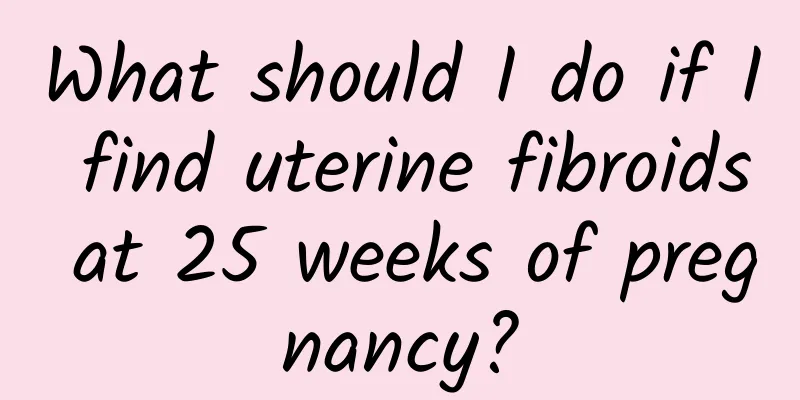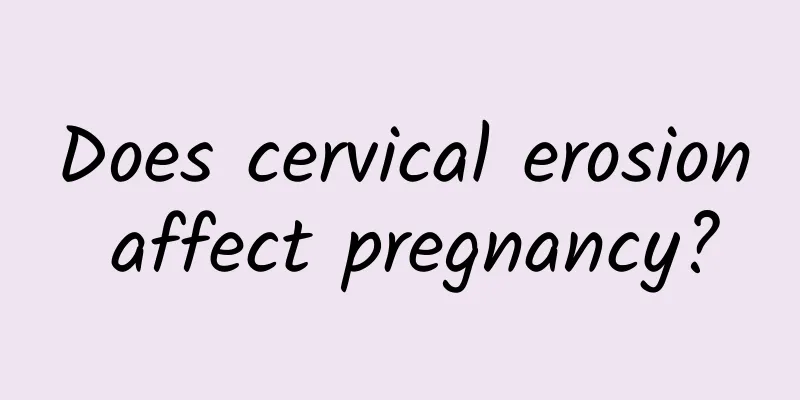What should I do if I find uterine fibroids at 25 weeks of pregnancy?

|
Uterine fibroids are tumors of the female reproductive organs and are also one of the diseases that endanger women's health. If uterine fibroids occur in the late pregnancy, it will affect the health of the fetus. So what if uterine fibroids are found within 25 weeks of pregnancy? Uterine fibroids are benign tumors composed of uterine wall muscle and fibrous tissue, which are more common in middle-aged women. Fibroids that grow in the muscle wall are called intramural fibroids, and those that grow in the uterine cavity are called submucosal fibroids. Submucosal fibroids often cause menorrhagia, irregular bleeding, infertility and miscarriage, and are called subserosal fibroids, which have no symptoms of irregular bleeding. Not most pregnant women have uterine fibroids, because the location of uterine fibroids affects the normal movement of the fetus in the uterine cavity. The treatment of uterine fibroids found after pregnancy should be determined according to factors such as the month of pregnancy, the size of the fibroids, and clinical manifestations. If it is a small fibroid, asymptomatic, it cannot be treated, but it should be checked regularly. You can wait until full-term cesarean section and resection surgery. After 25 weeks of pregnancy, if the uterine fibroids are not serious, you can wait until after giving birth to treat them. If they are serious, you can take medicine under the guidance of a doctor until delivery. If the fibroids are large, they will affect the contraction of the uterus, causing abnormal labor and delayed delivery. In addition, the possibility of placental retention, postpartum hemorrhage and postpartum infection is higher than that of normal pregnant women. Pregnant women who are found to have uterine fibroids in the late pregnancy should try to choose a cesarean section as the delivery method. The fibroid removal surgery can be performed at the same time as the cesarean section. When uterine fibroids are found in late pregnancy, you should first go to the hospital for a detailed gynecological examination to understand the condition in detail and then decide how to treat it. Generally speaking, if the condition is small and there are no symptoms, pregnant women can be treated after delivery. If it is a serious fibroid, myomectomy should be performed during cesarean section. |
<<: Is it okay to do laparoscopy for pelvic effusion?
>>: What should I eat when I have heavy menstrual flow?
Recommend
How to provide more comprehensive care for patients with cervicitis
The cervix is an important part of the uterus, ...
4 ways to detect ovarian cysts
Ovarian cyst refers to the formation of tumors in...
What are the symptoms after miscarriage?
With the development of society, sexual issues ar...
What are the hazards of uterine fibroids? Who are the high-risk groups for uterine fibroids?
Understanding of uterine fibroid surgery: uterine...
What medicine should I take for chronic cervicitis? What are the symptoms of chronic cervicitis in women?
What are the symptoms of chronic cervicitis? Thes...
Hyperprolactinemia nursing knowledge
Treatment for high prolactin. Prolactin is a poly...
Is ovulation bleeding before or after ovulation?
Does ovulation bleeding occur before or after ovu...
What should I do if I have yellowish leucorrhea and nose discharge right after my period?
What should I do if I have yellowish leucorrhea a...
This is how you do stepping exercise! Just use the steps
So, let's start climbing the stairs. Stand in...
Does mild cervical erosion affect conception? Precautions for treating mild cervical erosion
The uterus is a relatively important reproductive...
How much does ovarian cyst surgery cost?
How much does ovarian cyst surgery cost? Generall...
What medicine should women take to regulate their menstrual disorders? Chinese medicine prescriptions for women with irregular menstruation
What medicine should be taken to regulate irregul...
What are the best treatments for cervical hypertrophy?
For patients, if they have symptoms of cervical h...
Why does pelvic inflammatory disease keep bleeding?
Pelvic inflammatory disease that continues to ble...
How does pelvic inflammatory disease develop?
Many women are unable to realize their dream of b...









